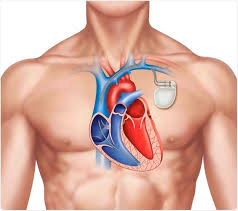New Research # 8, Battery Free Pacemakers.
Human heart is a main part of our body. Our heart pumps blood around the body and beats around 100,000 times a day during pumping the blood. Beating heart continue 24 hours without any break. If heart beats are stopped for any reason, we are dead. Human heart health is very important . A new device Battery-free- Pacemaker has been developed to regulate abnormal heart beat. To know better about blood pressure , please read “ Homeopathic Clinic-Blood Pressure, A to Z, part-1 ” .
Contents:
- Human heart.
- Heart beats.
- Pacemaker.
- Battery Free Pacemakers.
New Research # 8- Battery Free Pacemakers.
Human Heart:
As we know, our heart beats continuously without any break. As we grow older, our hear become weak. There are some other causes which affect the heart beats to make it abnormal. Heart beats on a regular rhythm which changes in response to the body activity. Abnormal heart beat is known as Arrhythmia. An estimated 5 % of the population worldwide has arrhythmia.
Heart beats:
A healthy adult heart beat rate at rest is 60 to 100 per minute. A lower heart beat at rest is considered good . It is believed that 5 % of people worldwide have an abnormal heart beat. Quick and irregular heart beat is common , affecting 33.5 million people worldwide and with an estimated 5 million new cases annually.
Pacemaker;
Abnormal heart beats are treated with medicines. In more severe cases , devices such as Pacemaker are used to control the abnormal heart beats. Pacemaker is a small device which can be implanted under the collarbone . Its wires are connected to the heart. The device recognize the missing/irregular heart beat. The device sends an on-demand impulse to the heart to regulate it.
Battery – Free Pacemaker.
Thanks to the new research from a collaboration between the University of Arizona and Northwestern University has developed a wireless, battery-free pacemaker. This device can predict cardiac events and provide more subtle stimuli to specific cells. The battery – free pacemaker use light to to target just the muscle cells of the heart which , researchers believe may reduce pain. The new battery-free pacemaker can be modified to fit the individual heart making sure how it deforms when beating.
The new battery-free pacemakers are digitally manufactured . The device has four thin film leaves which wrap around the heart. They are ultra thin and are enable soft mechanics to reduce impact on the hart. Dr. Philip Gutruf, the study co-author and assistant professor and Craig M. Berge , the faculty fellow at the University of Arizona explained ” The unique design of the battery – free pacemaker provide multisite excite of heart muscle cells, and its use of optogenetics provides targeted electrical stimulation to the heart muscle cells “.
Optogenetics is a technique based on the introduction of genes for light-sensitive proteins to specific cells. The modified cells express light -sensitive ion channels which allow them to be controlled by light. This is explained by the study author Dr, Igor Efimov , chairman of George Washington’s Department of Biomedical Engineering as under :
” Optogenetics is a technique, which is based on the interaction of light with a light-sensitive channel called Opsin. By design , Opsins are expressed using transgenic technology in specific cells , in myocytes – cardiac muscle cells “.
Targeting specific cells, as per scientists , are more efficient offering a pain-free alternative to current electrical treatments. Previously used pacemakers had to replace their batteries after a certain period. Since new battery-free pacemakers absorb current from the light, they do not need any small operation to replace their battery.
Is it possible to have pain after placing these battery free pacemaker in pain receptors of the heart ?. Dr. Shephal Doshi , cardiac electrophysiologist & director of cardiac electrophysiology and pacing at Providence Saint John’s Health Center in Santa Monica , CA explained as under:
” It is important to note that pacing does not activate pain receptors in the heart. The patients with the pacemakers typically do not feel any symptoms at all . Dr Doshi also said that biggest impact the study has , is potentially allowing defibrillation (Defibrillation is the use of an electrical current to help your heart return to a normal rhythm when a potentially fatal arrhythmia (abnormal heart rhythm) is happening in your heart’s lower chambers (ventricles) or shocking of the heart for those patients who have weak hearts , to be done in a less painful manner” He also said ” When patients have defibrillation of the heart muscle, they often do feel discomfort because the electrical current also effects other muscles in the body”.
source; medicalnewstoday.com

2 Responses
Thanks for the detailed information
Thanks for appreciation. Pl. keep reading other articles too and we will wait for your suggestions.